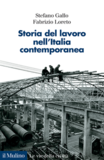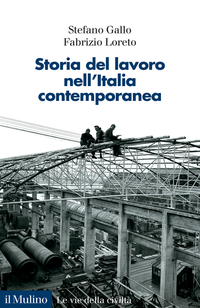Labour history in contemporary Italy
Date:
21 November 2023


The book Labour history in contemporary Italy by Stefano Gallo, Fabrizio Loreto is now available.
Description
If Italy is a republic founded on work, it is necessary to reconstruct the evolution of work in over 150 years of national history, including pre-republican history, in order to truly understand what this country of ours is and how it has changed. The gradual reduction of the agricultural sector, the processes of industrialisation first and then deindustrialisation, and the emergence of a tertiarised society are the three great economic moments that characterise this history. The forms of popular associationism, trade unionism and politics, industrial conflicts and relations, the development of labour law and the welfare state, as well as the specificities of women’s work, represent the junctions. What emerges is the political, economic, social and cultural history of an Italy that grew restlessly and at different speeds between countryside and factories, building sites and offices, commerce and transport, large Fordist companies and small and medium-sized enterprises, public and private work.
Stefano Gallo, senior CNR researcher, teaches History of Migration at the University of Pisa. His books include: ‘Without crossing borders. Le migrazioni interne dall’Unità a oggi’ (Laterza, 2012) and ‘La residenza contesa. Rapporto 2022 sulle migrazioni interne in Italia’ (with M. Colucci and E. Gargiulo, Il Mulino, 2023). Fabrizio Loreto teaches Labour History at the University of Turin. He was president of the Italian Society of Labour History. His publications include: ‘Sindacalismi, sindacalismo. La rappresentanza del lavoro in Italia nel primo Novecento’ (Ediesse, 2015) and Lucien Febvre’s ‘Lavoro e storia. Scritti e lezioni (1909-1948)’ (Donzelli, 2020).
For further information, please visit the publisher’s website.
Last update
18 March 2024, 10:28

 CNR – ISMed
CNR – ISMed